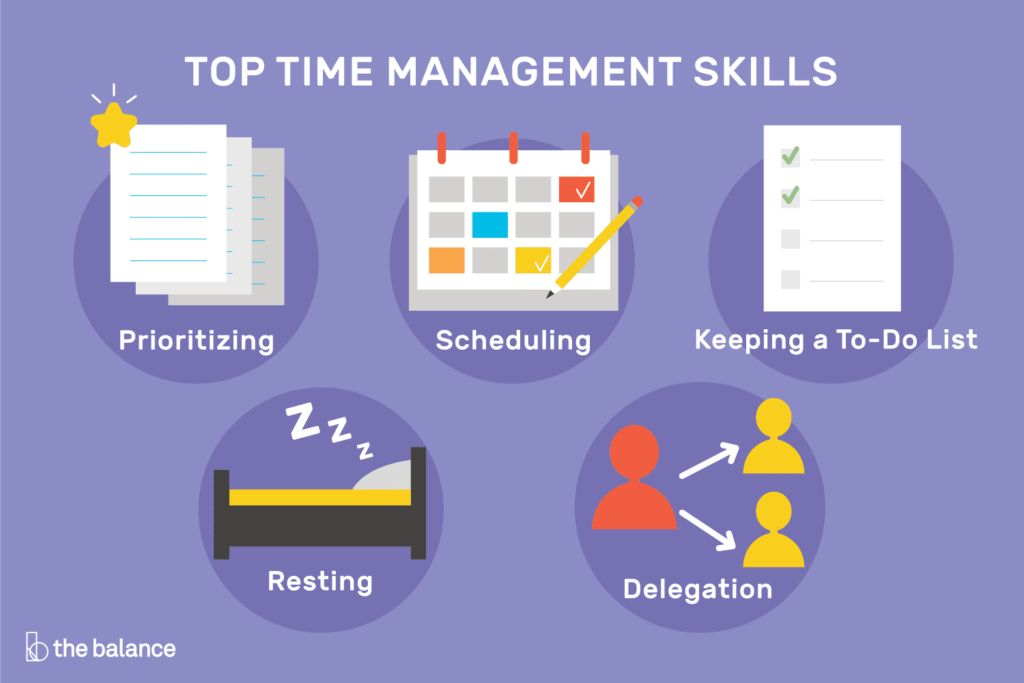
Time is a finite resource that we can never get back. That’s why it’s important to spend it well and not squander it. You can master the art of time management by changing your perception of time and by learning how to plan your days. These techniques and ideas will take your time management skills to the next level. (Estimated reading time: 8 minutes)
“The key is not to prioritize what’s on your schedule, but to schedule your priorities.”
— Stephen Covey
It isn’t enough just to envision a better life. We must take focused, deliberate, and timely action, which requires a combination of skill and the right mindset to be effective.
Where a lot of people falter is time management. No matter how well laid out our plans are, the fast pace of modern life tends to get in the way, and we find ourselves falling off the bandwagon.
Managing our time well is harder to accomplish in a society where people thrive on instant gratification and quick fixes. Instead of writing our term papers or making a sales call, we find ourselves scrolling through our IG or TikTok feeds, like consuming virtual candy.
As time passes, our dreams can slowly slip away, and we’ll find that we have no choice but to do things that are easier and require less effort. In other words, we settle for less because we couldn’t create time to manifest what we really wanted.
With every moment we squander and don’t put to good use, we dim our inner spark. Every time we make an excuse or put things off, we know deep down that we’re betraying ourselves.
Like an insidious phantom, our guilt will haunt us until we notice and acknowledge that our dreams and priorities are worth taking seriously and acting on.
We must wake up, acknowledge, and respect the value of time. In doing so, we shift from being victims of time to its masters.
Time is precious: learning to value time

Our time on Earth is finite. Through the lens of cosmic time, we’re only here only for a brief moment before disappearing into the ethers of eternity. While this may sound discomforting to you, you can actually use it as a source of motivation to make every minute count.
In the time we’re alive, all of us have been allocated 24 hours in a day, and 365 days in a year. It doesn’t matter if you’re a CEO of a multinational company or street vendor in the bazaars of Morocco – when it comes to managing time, we’re all working on a level playing field.
When we remain accountable, there’s no reason to feel victimized by the sands of time. Time flows the same for everyone.
But some of us are better at managing our time than others. Like a chef at a teppanyaki grill, they slice their days in a way that’s most appealing to their taste and palate, while some waste their time on inconsequential or menial tasks.
The problem isn’t that we don’t have enough time to do the things we want, but that we don’t prioritize certain tasks enough to make time for them. We fail to harness our excitement to create the structures needed to reach our goals and vision.
You can master the art of time management by learning how to expand your time through your perception and focus and by regulating your time through planning and strategy.
The expansion of time: forever is a state of mind
Time is a subjective experience. It depends on the quality of awareness and focus.
Humans have a peculiar relationship with the clock, as indicated by the famous saying, “time flies when you’re having fun. It drags when we’re waiting or bored.” Like a fickle companion, sometimes it’s on our side, other times it’s impersonal and races against us.
The study of time perception is a field in psychology known as cognitive linguistics. Neuroscience measures these subjective experiences based on a person’s perception of the duration of time between two successive events.
The focus for most studies has been the integral role that emotions like happiness, fear, and sadness play in the way we perceive the passing of seconds and minutes.
There are four additional factors that influence our time perception: the nature of the event that occurs, the type of activity we engage in, our personal traits and tendencies, and our time-related behaviors. Our age and life stage also plays a key role and how we perceive time.

To illustrate this phenomenon, think back to your life as a child. You may remember how time felt slower, and experiences seemed to stretch on forever. This is because as a child you were totally immersed in the moment and open to the wonder that life presented to you.
When we enter adulthood, we tend to either get stuck in the past or become too focused on the future. While it’s important to plan for the future and reflect on past events when needed, dwelling on those thoughts can cause you to completely miss out on the present, thus causing time to whizz by.
You can bring back that child-like experience of time by becoming more present in your life. Boost your present moment awareness using these five techniques:
1. When you are somewhere and with someone, give it your 100% attention. Don’t look at your smartphone or think about your next meal. Take in everything using all your five senses.
2. Focus on your breath. Take longer and deeper breaths and be grateful for the gift of life.
3. Schedule more relaxation or alone time that takes you away from the hustle and bustle of daily life. Use this time to tune out hurried thoughts, reflect, or engage in a fun hobby.
4. Avoid consuming too much media and technology. This not only distracts your thoughts but also saps your time. This includes phones, social media, and watching or reading the news.
5. Schedule specific times when you can reflect on your accomplishments. This gives you time to “digest” experiences on a deeper level, even after you have gone through them.
Increasing the quality of our time goes in tandem with creating structure in our daily lives to increase our productivity and get more done.
Budgeting time: Get the most out of your days
Many of us are prone to defining ourselves by how much money we have and don’t have. But time is more valuable than money. Money is a resource that you can generate, but time is something you can’t get back.
The only commonality between time and money is that both are limited. You have a certain amount of cash in your bank account, and you have a set number of hours in a day.
In an article for Harvard Business Review, Allison Rimm writes, “time is a finite resource, but people rarely budget their time with anywhere near the rigor they apply to their finances.

Charles Darwin said, “A man who dares to waste one hour of time has not discovered the value of life.” Like Darwin, successful people of all stripes plan their day more carefully than the average person, and they get more done in a shorter duration of time.
To follow in their footsteps, we need to stop making time management more complicated than it needs to be. All that’s needed is for us to find simple and effective techniques that work best for our personality, pace, and lifestyle.
Here are some general guidelines to keep in mind as you budget your time and master the art of time management:
1. Choose a time management tool: This tool should offer a template on which you can plan your day. You can use a diary, an app, a desk organizer, or time management software on your computer. It could be as basic as a to-do list you stick on your fridge.
2. Prioritize by using Pareto’s Law of Efficiency: Pareto’s law, also known as the 80/20 principle, states that 20% of one’s inputs produce 80% of the outputs. Essentially, this means that 80% of what you produce comes from only 20% of what you put in. Use this law to identify your strengths and eliminate your inefficiencies.
3. Apply the “crunch time” principle: Parkinson’s Law states that work expands to fill the time available for its completion. This means that if you give yourself a week to complete a two-hour task, then (psychologically speaking) the task will increase in complexity and become more daunting. By assigning the right amount of time to a task, you gain back more time, and the task will reduce in complexity to its natural state.
4. Get rid of “time leaks”: Search for the “time leaks” in your current schedule that represent the 80% that is not producing any significant results or outcomes in your life. Eliminate activities or people who just take too much of your time and don’t bring anything of value to you.
5. Plug in action steps you need to take to achieve your goals: Make a list of the action steps you need to take each month to accomplish each goal. Schedule those action steps in a weekly and daily format.
6. Make time for chores: List all the chores you need to do like buying groceries, visiting the bank, cleaning your home, etc. Put that into your schedule.
7. Plan for self-care activities: List down all the things you love to do for fun and your self-care routine. Plug those into your weekly schedule.
8. Review: Do weekly, monthly, and annual reflections on how you have used your time.
Ask yourself:
- Am I able to accomplish everything I want to accomplish?
- Can I take on more?
- Do I need to cut down?
- Am I having fun?
- Does my life feel balanced enough?
- Do I feel rested?
- How are my energy levels?
- What were the highlights?
- What were the wins?
- What were the challenges?
Every moment presents an opportunity to begin anew. Don’t let the past pains and mistakes hold you back from making the most of the promise and potential that the future holds. Learn the art of time management, hold on to your dreams, and keep moving forward on that wide open road.
All my best on your journey,
Seline

Question for you: What is one skill that you need to work on more so that you can master the art of time management? What are some initial steps that you can take?
Did you like this post? Sign up below, and I’ll send you more awesome posts like this every week.

This is really an excellent post. Where do you get all this wisdom?
Thank you George! 🙂 Lots of research and some from my head.
Ooof. This one hit close to home. Thanks for being willing to tackle topics like this and to offer insight that many of us need to hear- whether we want to or not LOL!